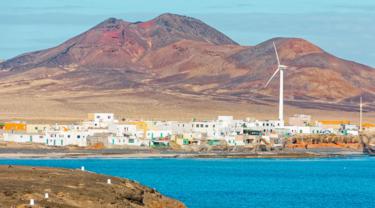
Microgrids: A new technology opportunity for Canadian exporters
Canadian companies are distinguishing themselves in the next big — yet small — trend in renewable energy projects, namely microgrids.
Soon after Montreal’s Tugliq Energy Co. proved it could build and run a microgrid at the Raglan Mine, located in Nunavik in Quebec’s high north, it set its sights on the international market. Today, the company is actively pursuing deals in Comoros Island and also in the Caribbean and Mexico. The company’s officials have also explored opportunities in Peru and Chile.
Tugliq’s first move was to take on the Raglan Mine project on home turf in Canada to make sure the technologies worked together, then they could start exporting their successful idea.
Microgrids are small-scale power grids that can operate independently or in conjunction with the area’s main power grid, and, in cases where there is no main power grid, they can provide much needed illumination and energy to those who don’t currently have it. The beauty of these projects is that they can incorporate wind energy as well as solar, harnessing renewable energy and reducing the world’s carbon footprint.
“We are delivering the environmental attributes that we set out to do at Raglan,” said Nicolas Seguin, head of business development at Tugliq. “After 28 months, we have 5.2 million litres of diesel that has been displaced by a three-megawatt wind turbine.”
One of Tugliq’s important competitive advantages is the storage component of the grid — which includes a fly-wheel, a lithium battery system and a hydrogen loop — all of which store and disseminate excess wind power when needed.
“The storage technology helps the integration and we’re also testing all three storage technologies to see what’s best to use in future projects,” Seguin said.
Hot on the heels of the Raglan project, he was heading to Africa in early February to negotiate a contract for a solar-based microgrid with the government of Comoros Island to help power three of its small islands.
“I was there in November, looking at potential locations for a solar farm and we’re heading back there soon,” he said.
Bruce Dudley, senior vice-president of Delphi Group, said microgrids are a tremendous opportunity for Canada.
“If Canada can get this right, we can create the kind of breakthrough opportunity that we saw with hydroelectric 20 years ago when Canada owned 33 per cent of the global hydroelectric market,” Dudley said. “Microgrids represent that kind of opportunity. They will leapfrog distributed energy in Africa. It’s a really important transformative piece to get right, not unlike what cell phones did for communication in Africa.”
Microgrids are catching on, according to Lynn Côté, the cleantech lead on Export Development Canada’s (EDC) cleantech team.
“When you look at northern communities, oil, gas, mining work sites and just generally at developing countries, the notion of a microgrid makes a lot of sense,” Côté said. “All you need are some small turbines, solar panels and some technology that keeps it all running. You need energy storage systems to store excess energy for when the wind isn’t blowing and the sun isn’t shining and then you need analytical tools that can turn one on and the other off. And you might need some backup power — a generator if all else fails.”
She noted that Canada has a lot of the technology required for microgrid development. “If we can showcase this in the North, or in a mining community, or on an island, we can go abroad and show them how we’ve built them. We can show we have the technology, we have the problem and we can figure it out here and in other countries.”
Toronto’s NRStor Inc., whose motto is “inspiring the grid,” is also already reaching beyond Canada’s borders with the microgrid concept.
“We are actively developing microgrid projects in Canada’s remote indigenous communities, and also pursuing opportunities outside of Canada,” said Jason Rioux, vice president and chief development officer at NRStor. “We’re looking at international plays where we strong local business relationships and where we think we have a competitive advantage. We’re looking at the Caribbean and Hawaii. In a lot of cases, it’s all about a track record and having confidence that you can deliver on your commitments.”
Jason’s company works in energy storage specifically, so it focuses on microgrid projects that have renewable energy storage as a major component, and where they are able to invest capital to fund the projects.
Temporal Power, a Mississauga company, had a contract with the Aruba government to install a five-megawatt flywheel energy storage system to help the island nation get to its goal of producing 100 per cent of its energy from renewable sources by 2020.
“Microgrids are cutting-edge technology when it comes to the equipment that manages the flow of power. Putting it together in the context of community planning is a new thing and it’s happening now,” said Côté.

















